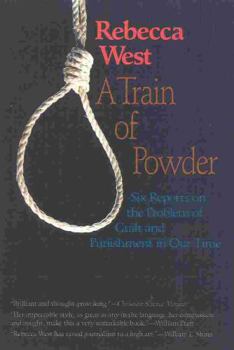A Train of Powder
Select Format
Select Condition 
Book Overview
Written between 1946 and 1954, these accounts of four controversial trials explore the nature of crime and punishment, innocence and guilt, retribution and forgiveness. "Astonishing."-Francine Prose.
Format:Paperback
Language:English
ISBN:1566633192
ISBN13:9781566633192
Release Date:August 2000
Publisher:Ivan R. Dee Publisher
Length:320 Pages
Weight:0.85 lbs.
Dimensions:1.0" x 5.4" x 8.2"
Related Subjects
Fiction Law Literary Criticism Literary Criticism & Collections Literature & FictionCustomer Reviews
1 rating
Questions the Assumptions We Make About Punishment
Published by Thriftbooks.com User , 15 years ago
The headnote for A TRAIN OF POWDER: SIX REPORTS ON THE PROBLEM OF GUILT AND PUNISHMENT IN OUR TIME by Rebecca West is, "Our God is not out of breath, because he has blown one tempest, and swallowed a Navy: our God hath not burned out his eyes, because he has looked upon a train of powder." by John Donne. But I think West's point may be that mankind can get out of breath trying to blow out the tempest of determining guilt and innocence. This book is an examination of this situation, and in true West form, it's an insightful, enlightening and enriching examination. It took me about two weeks to read this 310-page book. I found this book because I was tracking down a rumor that Rebecca West had written a book on the Nuremburg trials that was similar to her masterpiece Black Lamb and Gray Falcon: A Journey Through Yugoslavia, which is one of the top five books I've read in my life. I could not track down this book until I read a biography of West, and I learned that this was the book. It is not the tour de force that Black Lamb is, but it is West; therefore, it is worth your time! West writes six essays considering the issue of guilt and punishment in our time (well, 20th century, but it's cogent). Three of the essays are about how to distribute the guilt for WWII -- the holocaust and the partition of Berlin -- and are written over eight years as West investigates these issues and follows the results of the trials. And these essays are thoughtful, illuminating and they crystallize much of the thinking that spins around large issues like this. These essays, "Green House with Cyclamens" I, II and III focus on the humanity of all the players, their own lenses and their goals. She writes of the sentencing, "For when society has to hurt a man it must hurt him as little as possible and must preserve what it can of his pride, lest there should spread in that society those feelings which make men do the things for which they get hanged" (p. 41). West shines even more, though, in the other three essays, "Opera in Greenville," "Mr. Setty and Mr. Hume" and "The Better Mousetrap," which deal with a racial lynching, a brutal murder and a British spy case, respectively. While the Nuremburg trials are "large," these essays focus on more local aspects of guilt and punishment, which allows West to work more at the knot of human guilt and what other humans can ever really do about it. "Mr. Setty and Mr. Hume" was my favorite piece, as it examines in depth a brutal murder in London along with all the ambiguities of what can be known about guilt and innocence in the case. I could not put this essay down! And what is brilliant about it is that while West engages in an exhaustive examination about what is known about the crime, she doesn't prescribe what should be done about it, because the culpability is so vague. What West does so well, as take a cloud of vague sentiment or knowledge and crystallize it into a single sharp point. This whole book leads back to the





